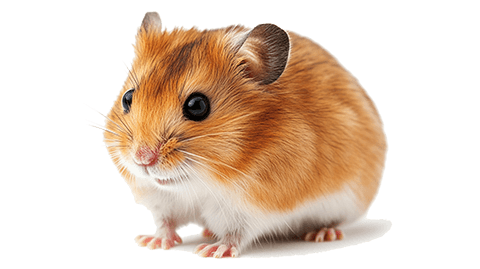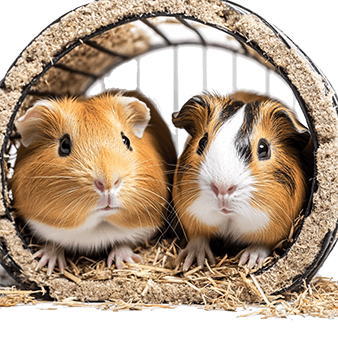Small Pet Care: How to Keep Your Little Friends Happy and Healthy
Caring for small pets, whether they’re hamsters, guinea pigs, rabbits, or other little creatures, can be incredibly rewarding. These pets may be small in size, but they have big personalities and specific needs. Ensuring your small pet has the right environment, diet, and care can help them thrive and bring joy to your home. This guide will walk you through the basics of small pet care and provide species-specific tips to give your pet the best possible life.

The Basics of Small Pet Care
While each small pet species has its own unique care requirements, there are general principles that apply to all small animals. Whether you’re caring for a hamster or a rabbit, these foundational tips will help you keep your pet healthy and happy.
Housing
Your small pet’s enclosure is their home, and it’s crucial to provide an environment where they feel comfortable, safe, and stimulated. The size and type of enclosure depend on your pet’s species. For example, hamsters and mice thrive in well-ventilated cages with plenty of tunnels and exercise wheels, while guinea pigs and rabbits need larger habitats with space to run, hide, and explore.
Make sure to include hiding spots and bedding material to provide a sense of security. Small animals love to burrow, so soft bedding like paper-based products or hay (for species like rabbits and guinea pigs) will make them feel more at ease. Be mindful of the temperature in the room where your pet’s enclosure is located, as small pets can be sensitive to drafts and extreme temperatures.
Diet
Proper nutrition is key to your small pet’s health and longevity. Each species has its own dietary needs:
- Hamsters and Gerbils are omnivores that enjoy a mix of pellets, seeds, fresh vegetables, and the occasional insect.
- Guinea Pigs require a diet rich in hay, fresh vegetables, and fortified pellets. They also need a daily source of vitamin C, as their bodies cannot produce it on their own.
- Rabbits are herbivores, and their diet should consist primarily of hay, supplemented with fresh greens and a small amount of high-fiber pellets.
Always provide fresh water in a bottle or bowl, and ensure it’s changed daily. Avoid feeding your pet sugary or processed foods, and research any new foods to ensure they’re safe for your specific pet species.
Exercise
Even small pets need plenty of exercise to stay physically and mentally healthy. Providing toys, tunnels, and exercise wheels in their enclosures allows them to move around, explore, and burn off energy. Hamsters, for example, love running on wheels, while rabbits and guinea pigs enjoy hopping around and exploring their space.
For more active pets like gerbils and rats, creating a stimulating environment with climbing toys, digging areas, and interactive objects can help keep them engaged and prevent boredom.
Social Interaction
The social needs of small pets vary by species. Guinea pigs, for example, are highly social and thrive when kept in pairs or small groups. In contrast, Syrian hamsters are solitary creatures and can become aggressive if housed with other hamsters. Understanding whether your pet needs companionship or prefers to be alone is essential for their emotional well-being.
If your pet is social, spend time interacting with them daily, offering gentle handling, and allowing them to explore safely outside their enclosure. If they prefer solitude, respect their space while still providing enrichment to keep them mentally stimulated.
Grooming and Hygiene
Regular grooming is essential for maintaining your pet’s health. Long-haired guinea pigs and rabbits may require frequent brushing to prevent their fur from matting, while other pets like hamsters generally groom themselves. Ensure your pet’s claws are trimmed when necessary to avoid overgrowth, which can cause discomfort or injury.
Keeping your pet’s living environment clean is equally important. Remove soiled bedding regularly and clean food and water dishes daily. A clean enclosure reduces the risk of respiratory infections, skin conditions, and other health problems.
Vet Care
Small pets may be prone to hiding signs of illness, so it’s important to observe any changes in their behavior, eating habits, or appearance. Regular vet check-ups with a veterinarian experienced in small animals can help detect health issues early on. Common signs that your pet needs veterinary attention include lethargy, loss of appetite, changes in stool or urine, or difficulty moving.

Top Tips for Small Pet Care
To keep your small pet happy and healthy, consider these additional tips:
- Create a stimulating environment: Rotate toys, introduce new tunnels, and offer chewable items to keep your pet mentally engaged.
- Handle with care: Small pets are often delicate, so always handle them gently and learn the best way to hold them based on their species. For example, rabbits should be supported under their hind legs to avoid injury.
- Provide fresh water daily: Ensure your pet has access to clean water at all times, and check their water bottle or bowl daily.
- Watch for signs of stress: Small pets can become stressed easily. A calm, quiet environment will help them feel safe. If your pet shows signs of anxiety, such as hiding more often or displaying unusual behaviors, try adjusting their environment or routine.
- Establish a routine: Small animals benefit from consistency. Feeding them at the same time each day and giving them regular playtime helps create a sense of security and stability.
Small Pet Species Care Guides
While the basics of small pet care apply to most species, each type of small pet has its own unique needs. Understanding these specific requirements will help your pet live a long, healthy, and happy life. Here’s a quick overview of the care needs for popular small pets:
- Hamster Care: Hamsters, especially Syrian hamsters, are nocturnal and enjoy burrowing, running on wheels, and exploring tunnels. They need a cage with plenty of space for enrichment and a balanced diet of pellets, seeds, and fresh vegetables. Read more about hamster care →
- Guinea Pig Care: Guinea pigs are social, affectionate animals that thrive in pairs or groups. They require a large cage, plenty of fresh hay, and daily vegetables to stay healthy. Because they can’t produce their own vitamin C, supplementation is essential. Read more about guinea pig care →
- Rabbit Care: Rabbits are active, curious pets that need space to hop and explore. They require a diet high in fiber, primarily consisting of hay, with fresh vegetables and pellets as supplements. Regular grooming and nail trimming are also necessary for their well-being. Read more about rabbit care →
- Gerbil Care: Gerbils are active and love to dig and explore. Providing them with an enclosure that includes a digging area, tunnels, and plenty of toys is essential for their happiness. Read more about gerbil care →
- Mouse Care: Mice are small but energetic pets that enjoy exploring their environment. They need a secure cage with plenty of climbing opportunities and a diet of pellets and fresh produce. Read more about mouse care →
- Rat Care: Rats are intelligent and affectionate pets that thrive on mental stimulation. They need a spacious cage with plenty of toys, hiding spots, and interactive objects to keep them engaged. Read more about rat care →
You can click on any of the species care guides above to get specific tips for your small pet’s needs. From choosing the right food to creating the perfect habitat, we’ve got all the information you need to make sure your little friend is well taken care of.
Final Words—Caring for Your Small Pet
Taking care of small pets can be an incredibly joyful experience. With the right care, attention, and love, your small pet will thrive and become a cherished part of your family. Whether you’re just starting your journey as a small pet owner or are looking for new ways to enrich your pet’s life, these guides will help you ensure your pet stays happy and healthy for years to come. Explore the species-specific care guides for more in-depth information, and remember—happy pets make happy pet owners!

